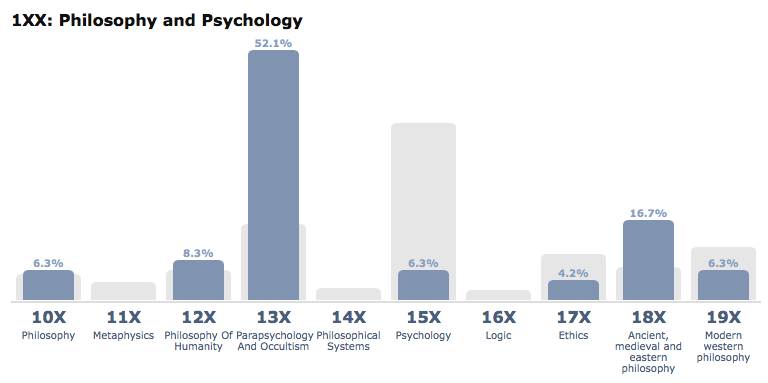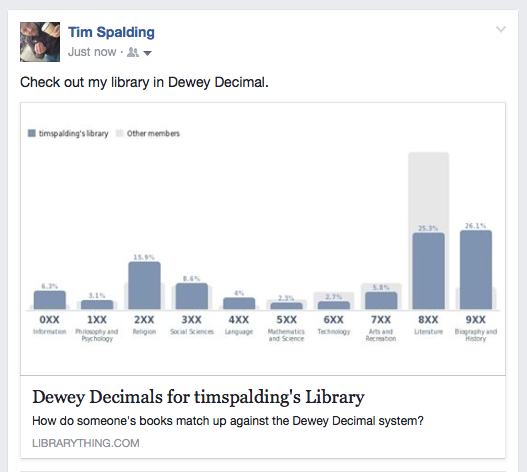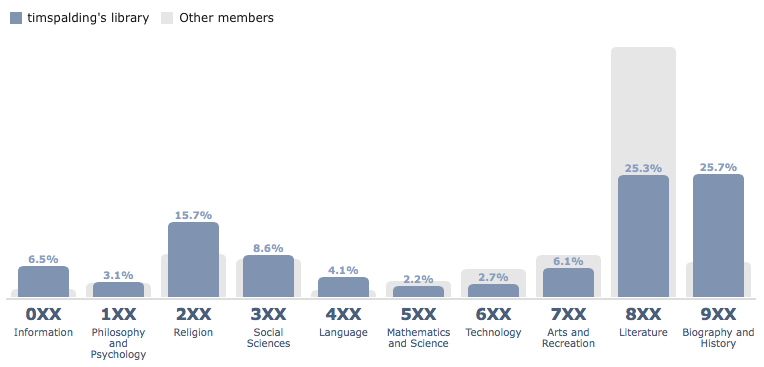We’ve made a handy graphical way to see how your library matches up with Dewey®.
The Dewey Decimal System®, also called the Dewey Decimal Classification® (DDC)—called the “Melvil Decimal System” on LibraryThing for legal reasons—is the classification used by most public libraries, especially in the US. First developed in 1876, it divides the world into ten major categories 0-9. Each of these are further subdivided 0-9 again, twice, yielding a number between 000 and 999. Further division is accomplished by adding a decimal point (.) and adding more decimals. It’s imperfect, but it’s simple—and it’s everywhere.
- You can look at your own here: https://www.librarything.com/profile/MEMBERNAME/stats/ddc (if you’re signed in, “MEMBERNAME” will work to get you there)
- And explore mine here: https://www.librarything.com/profile/timspalding/stats/ddc
- You will also find that, if you post your page to Twitter or Facebook, it will post a full-sized graph–a hint of a feature that’s coming more generally soon.
- Explore the whole Melvil Decimal System on LibraryThing, including our Dewey-Emoji mashup, Dewmojis.
- Come Talk about it on talk, and help us improve it.
Here’s what it looks like on the top level. I have a lot of history and religion. True enough.
Here’s one level down. Did someone say “occult”?

Here’s what it looks like posted to Facebook:

“Dewey,” “Dewey Decimal,” “Dewey Decimal Classification” and “DDC” are registered trademarked of OCLC, an Ohio-based library cartel.
Labels: classification, new features






Any way to share these bar graph images on “social” (yet increasingly anti-social) media?
As mentioned in the blog post above: “You will also find that, if you post your page to Twitter or Facebook, it will post a full-sized graph–a hint of a feature that’s coming more generally soon.” So, all you need to do is copy/paste the link to your Dewey chart on social media, and it will show this image.
Alas, no graphic shows when posted on Facebook – just a large blank area.
Sorry to hear that. Mind shooting us an email (info@librarything.com) with more details? We’ll be happy to help you from there.
This is very cool …. thanks!
Another nifty LT thingy. Just what I wanted.
Yippee Yay ! Keep up the good work.
This will be very helpful to me. I have so many books that I use the Dewey Decimal System to help organize them – especially when I make the grandkids help pickup. I am still in the process of doing this and have been using the OCLC website to get the codes (http://classify.oclc.org/classify2/). They don’t have them all and sometimes I find it difficult to understand why a particular code is chosen.
This is very interesting, but I’m curious what information you use to determine the classification. The catalog record, or my comments or tags? For example, my library shows only 23 biographies, but I believe the number is closer to 90. Please explain. Thanks!
This chart is based on the data for each individual book’s Dewey Decimal number—if that’s part of your book’s record. If not, it accounts for DDC info attached at what we call the “work level“. Each book on LT corresponds to a work page, which represents all copies of a book, regardless of edition, publication date, title variant, or language. Essentially, unless you have the sole copy of a book that exists on LibraryThing, and you cataloged it from a data source that does not include DDC data, our system makes a calculation based on all other copies/data sources—a best guess as to a valid DDC number.
If you have further questions, please email us at info@librarything.com and we’ll be happy to help you from there!
If y
Correction, your analysis shows only 5 biographies, 92x.
How does it know the Dewey if I don’t input the Dewey? I don’t have a Dewey Catalogue in which catalogue my collection.
It might be pulled in based on the data source you used when cataloging. Barring that, the system makes a best guess at a Dewey number based on other members’ data from folks who’ve added the same book. If you’re the only one with a given book on LT, and your data source for cataloging it did not have Dewey info, it will likely be blank and not calculated.
You can see your Dewey data in Your Books by adding the “Dewey Decimal” field to one of your Display styles (look under “Classification” on the right-hand menu). Please email us at info@librarything.com (or post on Talk) if you have any further questions.
I’ll just throw it out there that the Universal Decimal Classification is used as the main system in 34 countries (source). Just in case there’s some legal advantage to be found there. 😉
https://en.wikipedia.org/wiki/Universal_Decimal_Classification#The_application_of_UDC
really cool idea. Any chance of a Library of Congress number version coming out?
Thanks! We don’t have any current plans to add this feature covering the Library of Congress system just yet, but it may be coming further down the line!
“…OCLC, an Ohio-based library cartel.”
Haha! That’s awesome!